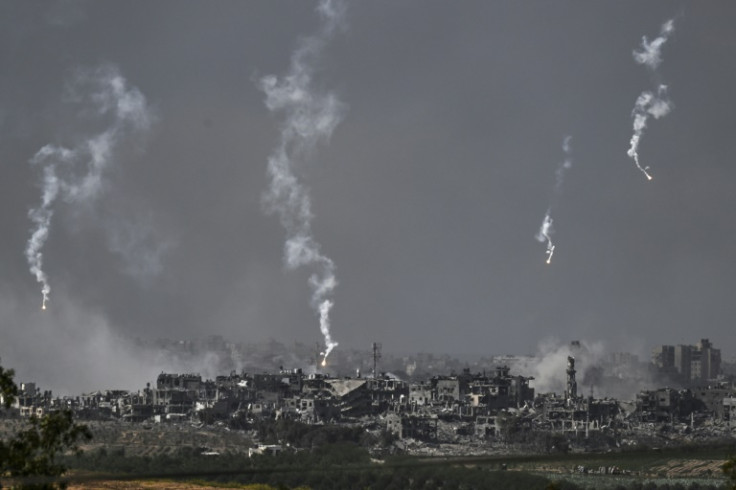
As the war between Israel and Hamas continues to dominate the global public conversation, different Latin American leaders took diplomatic measures against the former: Bolivia severed diplomatic ties, while Chile, Colombia and Honduras recalled their respective ambassadors.
All of them have criticized Israel for the magnitude of its offensive in Gaza following the attack by Hamas, whose members killed 1,400 people and took at least 240 hostages on October 7.
In this context, The Latin Times spoke with Merissa Khurma, director of the Wilson Center's Middle East Program, to understand why the war has elicited these swift responses when compared to other armed conflicts. Khurma also analyzed the war's latest developments as well as its geopolitical implications, which go far beyond Israel and Gaza.
This conversation has been edited for purposes of extension and clarity.
Why has this conflict inflamed the public debate so much more than others around the world?
I think this war is very intense and very intensive for multiple reasons, primarily because of the unprecedented and shocking nature of the October 7th attack perpetrated by Hamas. There have been so many different connections made to the trauma of pogroms and the Holocaust and that is part of the Jewish historical experience, which has been very dark and tragic.
Now, when you look at it from the history of the Palestinians, even if we're just looking at the numbers of those killed in Gaza, the vast majority are innocent civilians, over 3,500 children have died. So it makes it impactful for Arabs and Palestinians in the diaspora as a reminder of the 1948 Nakhba.
You also have the U.S.'s security interests in the region and the Iran factor, as well as its multiple proxies that have entered the theater in one way or another. That was the worry of many regional leaders from day one. So I think it stands out because the high risks of implicating so many other parts of the world.
Why have we seen such drastic reactions from Latin American leaders when compared to other events of the kind?
I think it has to do with the same thing: the fact that this implicates so many people around the world as well as the region. It remains central to U.S. national security and for global stability as well. I think that is why you're seeing all these reactions worldwide and particularly from different governments.
I think it is also a reflection of their demographics, their domestic politics and orientation. For the "Global South" this is sort of bringing back all of this trauma of imperialism colonialism, in particular those who recalled their ambassadors from Israel and accused the country and Netanyahu in particular of war crimes.

Do you see relations going back to the previous status quo or have red lines been crossed?
I think that it's going to take time for a lot of these diplomatic relations that have been currently strained or cut off to go back to what it was before. We've also seen statements from President Biden himself who said that after the war ends we cannot go back to the status quo ante when it comes to the Palestinians. It can't go back to the back burner, which is exactly what was happening.
It is going to take time for the region to emerge from this war and collect itself. Both governments and the people societies will have to have a reckoning of what happened and how can they go back to the negotiating table and pursue a political process that will get them back to what the international community has been calling for decades: a two-state solution. I don't see peace conferences taking place on day two or three after it ends, it's going to take time for people to be able to say 'I'm ready to talk.'"
How do you evaluate the speech by Hezbollah leader Hassan Nasrallah? Do you agree with the analysis that he said he's not going to escalate unless Israel does?
I listened to the entire speech and every minute I was wondering 'when is he going to talk about entering the war?' And he kept going around and around to talk about how well Hezbollah's already engaged in clashes.
He went around and tried to basically talk to multiple audiences. This was definitely an attempt to say something because there was mounting pressure on Hezbollah to just clarify where they're at.
Can it be said that there is a higher chance of the conflict being contained after his speech?
I think that's what many people in the region are really hoping for because if it expands Beyond Gaza and if the fighting intensifies more aggressively on the Lebanese border, then we are looking at a much longer war. In that case, it will completely destroy Lebanon.
I think for many of the leaders in the region in the Arab world, in Turkey and I think to a certain extent in Iran, they do not want to see this escalate further. The Iranians may be threatening and using escalatory language, but it's not in their interest for this war to expand and extend beyond Gaza and Southern Israel.
Netanyahu seems to be on shaky ground, with polls showing most Israelis want him gone after the war or even before. Do you see him surviving politically?
He's seen as one of the leaders that pushed away the two-state solution and made it less and less viable with the various policies that him and his various governments have pursued, particularly the latest government composition, which is the most right-wing government in the history of Israel. and are ministers in the cabinet that have used derogatory language to refer to the Palestinians and have called for the expulsion of Palestinians.
I think that there is a leadership vacuum in this regard. Many Israelis feel that it is the policies that he has pursued for his own political survival that has made it so difficult. and that led to the failures that may have contributed to the current situation.
© 2025 Latin Times. All rights reserved. Do not reproduce without permission.





